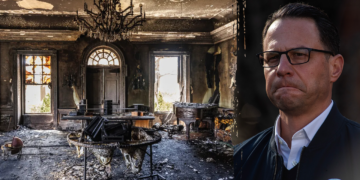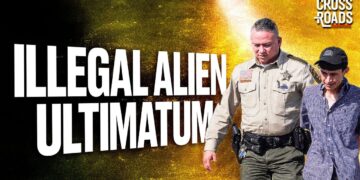So to say it lightly, there is a huge uptick in crossings on this border. And there is one person in law enforcement, one department, who can speak openly about this situation. Nobody else can. But that one department is the sheriff’s department. And so that’s who we’re gonna meet up with today,
The sheriff here, to get a better understanding of what this situation is like here on the ground. Let’s do this. (gentle guitar music begins) All right. Sheriff Dannels, where are we heading? – We’re gonna head to the border. (car door opening) – They’re chasing right now? – Can I show the screen or no? – No, that’s… We’ll get in trouble for that. But long story short, – Okay.
That’s popping up first for me so let’s head down that way. To put it in perspective, we had 1,578 people booked in our jail last year for border related crimes. Only 78 was foreign born, were illegals in this country. 1500 people came to my county to commit criminal, international crime.
We don’t have give-ups. We have complete fight and flight, pursuits, camouflage that get away from us. Nobody runs up to us and say, “Hey, I’m giving up.” – So let me explain that really quickly, or have you explain it. There’s give-ups and got-aways. So some migrants are coming over and they’re giving up
Because they know the US government’s gonna take them in, right? – Yes. And process them. Then they’re gonna have an asylum court hearing, who knows when, perhaps yours down the road. But the got-aways are the ones, and I’ll have you explain that. And that’s what we’re dealing with here, right?
– Yeah, we deal in Cochise County primarily, probably high 90%, if not almost a hundred percent of got-aways. These are people that are seen on cameras, seen by citizens, seen by my camera system here in Cochise County, and we don’t get ’em. We can’t find ’em. They get away from us.
These are a hundred percent smuggled through the cartels. They bring ’em up or they smuggle ’em. They put ’em in cars that come here from all over the United States, and then they take off on us. And that’s what Cochise County’s all about. – So I was just up in Yuma County.
I saw both, I saw give-ups and getaways. What you’re saying is, every area of the country on the border is different in that respect. Like there’s no uniform, it’s all happening the same way everywhere. – No, it’s different. Everybody has their different challenges based on the terrain, based on population and most important,
Based on the cartel south of us. – What’s their status right now? Are they increasing power, decreasing power? I know there’s a shake up with the Sinaloa cartel. – One thing that we haven’t seen, as they’re having this internal rift, external rift, with power within the Sinaloa cartel, the product’s still coming.
We know that humans are still being smuggled, which I call, by the way, “Modern day slavery.” They stuff these people, they take their money from ’em. There’s nothing consensual about smuggling, even though that’s a definition between smuggling and a trafficking. When you shove a seven-year-old in the trunk
Or you shove a seven-year-old on the back on the top of ’em with a bunch of adults on top of ’em, there’s nothing humane about that. – Yeah. – Nothing. – Sheriffs stand for three objectives; public safety, national security, and humanitarian. And that’s what I’m talking about with humanitarian.
So there’s not a win in any of those categories. In fact, just the opposite. It’s a lose/lose to this country and the people that are being exploited. – So this is quite a nice neighborhood. – It is, but we’re close to the mountains. So whenever you get close to the mountains,
That’s where they’re dropping out of when they come that way. – You’re saying, they’re coming over the mountains here? – Uh-huh (affirmative). – That’s a serious hike. – Oh, it is. So right here in this neighborhood, they just took six illegals in this community
And then two United State citizens that were smuggling ’em. So my office took custody of ’em and we towed the vehicle. – How long ago did that happen? – 30 Minutes ago. So this is the neighborhood. And they got ’em right behind us here. – Okay. – This is a beautiful area.
It’s a beautiful county. It’s a special county. It’s home to 125,000 people, (traffic whoosing) but this neighborhood right behind us here is where they fled to. In Cochise County there’s a new law that went in effect last year that if you smuggle for profit, we can charge ’em for a Class 2 felony.
– Okay. – So since the law went into effect September 28th, we’re over a hundred people that we’ve charged. So again, it goes back to… If you smuggle in my county, the consequences are steep here for us at the state level. That’s Border Patrol right there. – Oh, that’s Border Patrol? Gotcha.
– Okay, so two US citizens… How does this work, the smuggling? Are they coming from Phoenix or different cities in America and just doing a caravan going back and forth? – They’re coming from all over the country. – Okay. – And they’re recruited through social media to include juveniles.
They go to Phoenix, they get their set up, get a car, whatever it takes, drive down here, they’re staged somewhere here until they’re told to go to a certain point to pick up. – Okay. – They jump out of the brush onto usually a highway like this.
Jump out, get in the back of the car, head down the highway. They throw off their camouflage, throw it in the road, throw it alongside the road and away they go. (indistinct radio chatter) – Juveniles. What do you mean? Like how old? – We got ’em 13 years old, 14.
We had last…. (indistinct) (Peter chuckling) – Not even, they don’t even have driver… – No, they don’t have driver’s license. Take mom and dad’s car or whatever car they can get their hands on and they come down here. (traffic whoosing) – How much are they making per migrant?
– When we first started last March, the details, when it start getting hot and heavy here… – Yeah. – It was a $1,000 to $1,500. Now it’s over $3,000 per person, per person. – Oh my God. – So you can come down in a minivan,
Pick up say four migrants, like what just happened, right? And you can make over 10 grand – Yeah. like that in a day’s work. – Yep. – Right. And I’ll show you some posts on that where… Yes, they can get that. And it’s just incredible scary money. It really is.
But it tells you the business and the profits that are being paid. If you can pay those dividends back, you can tell the billions of dollars they’re making down here. – So do the traffickers here, are the cartels paying them directly or the migrants coming over have the cash and are paying them?
– Two thoughts… Now first thought is, the migrants that are coming across have to pay the cartel. – Yep. And what is that now, right at that cost? – It’s a minimum about $7,000, six people. – To get over this border. – Get over the border. You get three attempts.
Then the cartels pay the drivers through social media to come here for $3,000 a head. These are US citizens working for criminal cartels, transnational organizations, across in a foreign country. And they’re working here for profit. So they’re a laborer on the US side that coordinates the efforts, (indistinct radio chatter)
Pays ’em, runs the stash houses, ’cause if they take ’em here they’re going to a stash house. And understand, a lot of these people don’t have all the money. So they become servant to these criminal cartels, drugs, sex, labor, gangs, you name it. So if I can stop it here,
I call it, “Preservation of life.” – Yeah. – And that’s what we’re trying to do, stop it here. I mean, listen, there are sheriffs, there are other law enforcement that don’t put the attention we do in Cochise County. If you get caught here, there’s consequences for it.
This is a destination to come enjoy our county, not to break our laws. – How are you doing? – So, a couple like this that lives here, do they know what’s going on or not really? – Oh, everybody knows. – Everybody knows. There’s no secret to what goes on in Cochise County.
We put out public’s safety reminders all the time. Let me just check, see what else we got here in this area. – So it’s THAT active. We just met up 40 minutes ago and there was already one situation. – Yeah. This is not like, it’s 24/7 somewhere in the county.
And the cartels spot us and they’re on the US side. They’re also on the Mexican side, but they spot us and they got a very elaborate plan. So they know where law enforcement, they know where my interdiction team is out. And they’ll flip the county and go to the other side.
It’s a cat and mouse game with deadly consequences. When you drive through these communities at over a hundred miles an hour. I think last year we put over 150, 180, whatever it was, people in our jail just for felony flight pursuits, from juveniles that we were manning to adults,
All the way to adults. The numbers are staggering for us. We’ve always had smuggling, but we’ve never had to the degree. And I say this all the time… I’ve seen the good of the border, the bad of the border and the ugly of the border. And now we’re seeing
The ugliest of the border. (indistinct radio chatter) – The what of the border? – Ugliest. – This is the worst you’ve seen it. Since when? – The worst I’ve ever seen it. – I’ve been here 38 and a half years. 38 and a half years, this is the worst I’ve seen it.
And it’s worse because we don’t have the messaging from Washington DC, from Congress. We don’t have it from the President of the United States, the Vice President or Secretary Mayorkas. All you hear is, “The border’s effectively secured.” That’s a false narrative. That’s complete false narrative. When people are dying in my county…
We just had that one last week again. When people die in my county, – Mm-hmm (affirmative). and they’re saying this is secured, that’s not an expectation I think is successful. – Yeah. – We had 72 structures burned down in 2011. It started in Mexico in an area where smuggling was prevalent.
And we think it was a diversion fire, but it got outta hand and burned 72 structures all the way up to back where we just came from. – Diversion fire. Explain that. – It makes sense. – Cartel diversion. – Starting fire. – So they’re starting the fire
So you guys are all your resources… – There, while they bring something over here. – Do they have the upper hand right now, do you think? – They DO have the upper hand. We’ve given ’em an extra hand to do that. (scoffing)
I mean, let’s just get real. We’ve allowed them to do this. And that’s the most frustrating thing there is. We can get this back. It’s just, we gotta have the will. And we don’t have the will. Our will’s been misplaced, to open it, not close it. And remember, law enforcement, we have disciplines,
We have policies, they have none. They have no rules. They know if we’re coming to a city, the chances are we’re gonna pull back. We’re gonna do some different interdiction compared to if we’re in a rural area. You’re taking a ruleless, lawless behavior against some disciplines and… It is frustrating.
– So my question, and I didn’t have the camera on, but so if you’re a 13-year-old doing this job, right? Once you go as low profile as possible, you’d creep in slowly. You would take the migrants out, make no noise. Why wouldn’t they just go slow out of here?
– And that’s the common sense approach, but this is nothing on this border we’re seeing that’s got any common sense built into it. We had one the other day, just two miles to my left here, 115 miles-an-hour, smuggling. Went by us very quickly and almost hit one of the law enforcement cars.
We chased him, ended up crashing another car here about five miles to my right. And then we took the vehicle down with spike’s. Driver got away. It’s frustrating. I mean, that’s so frustrating. But when you got two or three at the same time and you got depleted rural resources,
We’re doing everything we can. – Would the cartel, ’cause they don’t care, they just want their money… So would they actually tell some 13, 14-year-old, like, “Go as fast as you can.” Then it puts your resources on that car, then something else can go – That’s right over there or wherever.
– Once you isolate your resources, it opens up a big avenue, a big path. – Yeah. – And we know they do that. – We know it, where strategically, we’ve looked at this whole county. This is the 38th largest land mass county in the country. – Mm (affirmative). – 83 miles international border.
I got over 90 deputies, police departments. They got their resources. The troopers, they’re limited in resources. And then you got Border Patrol. And they’re so tied up with processing, they’ve lost a lot of their enforcement aspects. So we’re doing everything we can. On behalf of national sheriffs,
I actually was one of four, I believe it was, that actually sat on President Biden’s transition team to educate him, (indistinct radio chatter) inform them, bring awareness to what this border was all about. And I did that back in ’16 too, the election, after the election. I was very optimistic
That we were gonna go in a different direction. They were very complimentary to the efforts, the education efforts, the awareness and the enforcement and the innovative programs that we’re doing here. So I was shocked on the first day. This is before he took office. Then the first day he declared the southwest border,
A non-emergency and has shut down all the projects. And we’re still in frozen time in Cochise County. Even though Secretary Mayorkas called me over a year ago, December and said, “Hey, guess what we’re gonna do? We’re gonna do this, Sheriff.” And I’ve seen nothing. I’ve seen nothing.
– So the border has always been political, right? It’s always been a chip, a bargaining chip, let’s say, by each side? – Yes, and it’s got worse over time. And between President Trump and President Biden, it’s got the worst I’ve ever seen, you know? So… – So you do this,
You go up next to cars and look inside to see if anyone’s lying down or what? – Right. – If I pull up along side of that car, they recognize I’m law enforcement, you’ll be able to see right away. A lot of ’em just take off like…
– So how many times a day? Is it a day, a week, a month? How many times on this road here are you dealing with pursuits? – In the county here, I don’t know the stats just on this road, we run 2 to 3, up to 10 a day, somewhere in the county.
– 10 pullovers a day. – No, that’s pursuits. – 10 Pursuits a day! – That’s pursuits. – 10 high speed chases a day. – And you think about that for a second. That’s when, – Oh my God! and you look at, that’s the cops actually engaging with the vehicle.
You see it, there’s not a lot of cops out here. So they got the upper hand on that too. Those are ones that we actually get our hands, get behind, like I’m doing right now where I’m actually doing proactive patrols. – So sheriff, this is one of the main arteries, right?
– This is. This is about 15 minutes from the border. So the smugglers drive down this highway south to the border, pull off along the road where they’re told to pull off. They jump outta the brush, jump in the car, and they’re gone within minutes. And they come north right through here.
– What nationalities are you seeing the most of right now? – We see it all, we do, we see it all, but mainly from the Northern Triangle, Mexico, that area. – Right, because there’s OTM, other than Mexicans. Mexicans will be sent back immediately by Customs and Border Protection, right?
– Pending their statement of asylum. – Okay, and so… – If they say the fancy words, they don’t. – The fancy words. Okay. And they might get rid of their identification so nobody knows, right? – That’s right. We see a lot of that. – Okay. – Where they just,
They don’t even bring their identification. They start brand new here. – We’re the first sheriff to do what? – To be appointed on behalf of sheriffs throughout the country as a member of the Department of Homeland Security Advisory Council. This council is to help homeland security
Address community issues so it was an honor. when President Biden took over, within months after he took over, this administration, to include Secretary Mayorkas, sent a letter to 28 out of 31 of those council members and relieved us, in a time where the border needed more, the most attention.
We were doing great things, but in his mind, this administration’s mind, they wanna go a different way. And what I’ve been told that, two things, one, that’s the first time anybody’s EVER been relieved from that council. It’s a bipartisan committee. Second of all is, currently there’s not one law enforcement,
Active law enforcement that sits on that council. – Who sits on it? – Different groups, different organizations. The National Sheriff’s Association, our executive director who’s not a cop, he sits on it, but there’s no active sheriff’s on it. There’s no sitting police chiefs. IACP, their executive director sits on it.
But there’s not voices from the community. Those are executive directors that manage our businesses every day. – You spoke to Mayorkas directly. He came down here? – We met him in El Paso. – Okay. – We set up a meeting. – We had several meetings with DHS leadership,
Which wasn’t uncommon under the previous administration, maybe even former, but the means were all pretty much one way, where you weren’t allowed to have questions, you could just listen, listen both. – Okay. – And then when we had that meeting, I set up a group about 10 to 12 sheriffs.
I expressed my dissatisfaction to that, his letter. And he asked me, “Sheriff, you don’t think I have the right, or administration has the right?” It’s not about legality, it’s not what’s morally and ethically right for these communities in this border right now without even engaging with us.
And he said they thought, his administration and himself, thought they could do a better job. How can you say you’re better now than you were under the previous administration? And whether you like him or not, and I’ve said that, whether you like Trump or not, his policies were better handled.
Then they come back and say, “Well, that was inhumane treatment.” Let me just say this… National sheriffs came out with a photo album, which was shared with all 3000+ sheriffs in this country of the over 1000 migrants that have died coming across our border illegally.
– Mm-hmm (affirmative). – Tell me that’s not inhumane, that have died on US soil. We just had one last week, that nobody’s talking about. Nobody’s talking about. That’s inhumane. – So we’re right here. – This is it. – We’re right here at the border. – Okay.
– We’ll get out here, we’ll take a look. I’ll get you some film. – Look at that, sort of an old western town, huh? – It is. This is an old historic area. Been around a long, long time, man. This is one of the safest parts of the border in our county.
– So this fence here, when was this put up sheriff? – This was done back in the nineties, the mid nineties. – Okay. – People forget the history of the border, but if you looked at the history of the border… – Heads up I had to make good luck. You know what I’m saying? – Okay. (chuckling) In my business we take all the luck we can. (laughing) So this was a plan that was designed off two operations, “Hold The Line,” and “Gatekeeper,” from ’93/’94 era.
And what it did was, is planted the peace. It protected the port of entries on the southwest border. And it also protects the populated areas. Yuma, El Paso, San Diego were three populated areas that were protected. So they have a plethora of resources, staffing, technology. That’s why you see so much.
But as you go away from these designated areas ports and population, – Yeah. it goes to nothing. – Okay. – And the idea of that back in the 90s was routing the criminal activity, the cartels into those rural areas of the border, thinking that would be a deterrent for ’em.
Well, come up 20, 30 years later, 26 years later, – News flash. it’s been the best concealment they’ve had. They have exploited our rural counties. That’s why we’re a byproduct of so much. You see the wall here, this 31 foot? – Yep.
– That was President Obama that brought that up to 31 feet. A lot of people blame Trump. That was actually President Obama. When President Trump took over, this was being remodeled, not extended, but remodeled by President Obama. That project was left over to President Trump. And of course it’s finished.
– How was Obama with the border? Better than now, right? – A hundred percent better now. President Bill Clinton, a Democrat, was very good on the border. So what has happened since we’ve had President Obama, President Clinton and President Trump? We are so divided now that this border is so politicized now.
I mean two different lanes. And so we have complete open border philosophy and a secure border philosophy. (car alarm sounding) There’s no longer any more discussion about it. It’s politically driven. It’s not public safety driven for the people. It’s politically driven. – Right. You can’t… There’s gonna be no perfect solution, right?
It’s a messy topic and situation. (indistinct radio chatter) – It’s really not that messy. People make it messy because there’s so many opinions of political. It’s actually, if you enforce the rule of law and you have a strong message that, “We will have a secure border,”
Which also takes your oath of office to say, “Hey, I’m gonna protect this country of America,” whether you’re local, state, or federal, I take one to support the constitution, – Yep. and that says, “You will have a secure border.” – Okay, so someone might say, “Oh, you’re anti-immigrant. You don’t believe in immigration.”
– No. – What are your thoughts on that? – You look at all the people coming across the border illegally and claiming asylum. If they just come to this port right through there, – Yeah. they walk up here and say, “I want to claim credible fear asylum.”
– And then they go to a court hearing somewhere here? – Well, that’s where the system breaks. – Okay. – That’s where the federal government breaks this system. – So there’s no easy way to get the court hearing if there’s a legitimate asylum claim so…
– No, there IS an easy way. – Okay. – And Secretary Mayorkas, when I said we need to have asylum immigration officers in every port of entry, every region of southwest border. – Okay. – So when these people come across legally here and say, “Hey, I want to claim credible fear asylum,”
A judicial oversight from the federal government will address it right there and within two hours you will know if you fit our rule law. – So we just don’t have the staff. – We don’t have ’em. – No. – They’re just not here. – So what we’ve done is, once you make,
I call ’em, “Magical words,” which is well known, they’re released. They attend their first hearing, usually, within a year of that up to a year. – Okay. They’ll take it ’cause they get a lot of their benefits and they still get in the system. After that is when they disappear on you.
That’s when they disappear. Most of ’em you don’t see again after that. – Okay, I’ve done what, four or five, six trips now to the border and I’m still piecing together ’cause it’s like a lot of pieces, puzzle pieces you gotta put together. So let me get this straight. If you’re in Yuma,
If you’re not a get-away, but a, what’s the opposite? – A give-up. – A give-up. – If you’re a give-up, you get pushed through into the system immediately. Correct? – Yeah. If you’re a give-up, You’re in the US, you have papers, you have a court hearing,
Who knows when you can go off to whatever city and you’re legal in the country and all you did was just walk over the border, not through a port of entry like this. So technically, that’s breaking the law. – Yes. – But the only way to do it is to break the law.
That’s the way in because if you do it legally, there’s no one here to process anything. – And you’re released here. – Do I got that right? – I got that right? – No. – Okay. – We need, this is the problem I have. I’m all about legal system. – Yes.
– I’m all about humanitarian. Everything I’ve talked to you about this morning goes back to true humanitarian. Whether you’re from this country or not, it’s irrelevant. The law states that if you want to claim a credible fear or an asylum claim, you come through a designated
Point of entry like this. – Yes, yes. – You don’t have to come across our border illegally. We’ve said it’s okay because there’s no consequences for not holding them accountable, ’cause you’re breaking the law by coming to our country illegally. Most countries will expel you right away.
– Yeah. – We don’t expel ’em. There’s no consequences. Just get across. You’re here. Claim the words. It’s happening. There’s no difference whether you do it there now or if you do it where the law says you should do it. – So why wouldn’t you do it
Where the law says you should do it? – The main reason is, the cartels won’t let ’em. Cartels can’t make money that way. The cartels want it, – Ohhh! they’re in charge of this and they stay in control of ’em. Instead of doing it this way, they do it the illegal way.
Nothing’s, there’s no rules. Remember, we follow rules here, we’re supposed to. They don’t, the cartels have no disciplines or rules. – Oh, okay. Okay, so… – That makes sense? – So if you wanted to do it the right legal way, you’d just come up the highway somehow. – Come right through here.
– And go through, but the cartels aren’t gonna let that happen? – No. These communities, in fact, to enter this region, – Yeah. from Agua Prieta, it’s a port about 40 miles to my east, even before you pay your fees to come across to be, coyoted across by the cartels,
You gotta pay $1,000-$1,500, just to enter the region on the south side, to the cartels. – And they know you’re there? – They know you’re there. Yes. – In Texas, they were getting tagged, like plastic tags. – Remember, we’re dealing different business. They all do it a little bit different. – Okay.
– That’s why you have different demographics on our border. But my point on this is this, and this is what I told Secretary Mayorkas, why don’t we up the game of judicial oversight on all our regions and port of entries so we can address those immediately? Put this in perspective of a community.
I arrest somebody for DUI, I arrest somebody for murder. Within 24 to 48 hours is usually the norm hours throughout the country that you have to see a local judge, a justice of the peace or a superior court judge, district judge, however you wanna look at it, otherwise you’re released.
Think if I took those judges outta my community. I’d have to release murderers, DUI offenders, domestic batter people and release them into the community. There’s no difference here on the border. If you have judicial oversight that people realize that 9 out of 10 don’t even qualify for credible fear or asylum,
And that’s not my stat, that’s the stat they tell us from the federal government, and you see ’em going back because they can’t use those magical words, how many people are gonna be in line anymore? – They’re not gonna bother ’cause they’re gonna be sent back.
– Right, ’cause our rule law doesn’t accept that. – Yeah. – And those that do stay, that 1, 2 out of 10 that can actually qualify for that, then we have a good process. – Well it’s a real great strategy to show people the first time in this country that breaking the law
Is the way to get in. – It is. And that’s what I’m saying. – It’s a great example. – That’s part of that fracture. And they’re gonna keep breaking the law because there’s no consequences for doing it, when you can do it legally and still get the same end results,
But it’s more organized and orderly and people aren’t dying. If you look at the amount of money, the humanitarian money that we’re spending, because we’re not enforcing the rule of law, I was told that per week we’re spending $60 million on health and human services. – As a country. – As a country.
– $60 million. – For… – To take care of those… – Illegal migrants. – Yes. – Staying in hotels, feeding unaccompanied minors, you name it. Where that number is today, I couldn’t tell you, but I guarantee you it hasn’t got less. – I try to stay out of politics in my content.
We’re so politically divided with everything – Yeah. it’s just shoved down our throats these days. Right? – Right. – So I wanna be a channel where people go to to get a story and not be fed a narrative. What’s your take on… There’s just no way to avoid politics in this topic, right?
It’s just like one party wants to do one thing, one wants to do the other. It just seems like a game. – I will say this and I continue to say it, politics has no business in public safety. Never has and it’s been affected over the last few years.
It gets worse and worse and it’s just, it’s taken the morale away. It’s hurting our recruitment. It’s hurting our retention. And it’s taken the respect away from our profession. If you cut the extreme left politics, extreme right of politics, let our people go, we can get down the road on this. – Yeah.
– But until we get loud voices on each side gone, it’s only gonna get worse. – And nobody’s getting a full story of what this is. And I haven’t even fully captured it yet at all, ’cause there’s a lot to it. What you broke down there,
I never even knew a lot of that information. And so, none of our media really presents this to us, unfortunately. – And they don’t. I’ve always said this, we’re all entitled to an opinion, but we’re not entitled to our own facts, and the facts on this border. And I look at national media.
Why don’t you put it out the way it… – Why am I doing this? (laughing) – Yeah, why don’t I have you here? And I’ve talked to national media, don’t get me wrong. We got one major network that talks every day on the border
And you got the rest that don’t unless there’s a crisis. – And know what’s interesting, the majority of media will cover one story, which is true, but not the full story that there are people leaving a terrible situation and they’re seeking honest asylum. And that is a true story for some people, right?
But that’s a small percentage right now of who’s coming over because just like them, I would be doing the same thing. I see the opportunity up here, I’m gonna run with my family. Of course I would. Why wouldn’t I? Right? But they’re only reporting that true asylum case,
Which is, who knows exactly, but 10, 15, 20% of what’s actually happening here? We have an 80% plus of another story that nobody’s talking about that I’m trying to show, because it’s just blown my mind coming down to these regions and hearing it from everybody.
– I will say this and I said this with you a minute ago is, my lane’s not immigration. It’s not. – Yeah. – My lane is a sheriff, though immigration blends into what we do every day. My lane is the crime of it, the public safety side of it,
National security and the death and destruction we see exploited by these cartels, that’s where my lane is. – And I would talk to those guys and get ’em on camera, but they’re not allowed to. There’s a gag order or something now. – They won’t let you talk to ’em.
– They can’t talk. That comes from the high-ups. They’re not allowed to be transparent. In hotel lobbies, when the camera’s off, okay, we’ll get into the conversations, but I can never record that so the sheriffs are the only guys that can speak up, unfortunately. – Well,
I’ll say this. We have a lot of Border Patrol agents. I think we have five, 600 Border Patrol agents in our county, plus we’ve been up to over a thousand at times. I have yet to meet a Border Patrol Agent that, (A), hasn’t thanked our sheriff’s office, hasn’t thanked our troopers,
Haven’t thanked our local police departments for being there for ’em ’cause they feel abandoned. But number two, which is most important, I have not heard a Border Patrol Agent anywhere, even to include the leadership levels saying, “Sheriff, this is working. We’re proud of what we’re doing right now on the border.”
– They’re pretty, – Not once. they’re demoralized, huh? – They’re demoralized, they’re frustrated and they’re insulted. I promise you to that. And can they tell you that? Of course they can’t tell you, but I sure as heck can and I will. – Yeah. – Until this is fixed,
I will continue to voice these frustrations. See all the crap, the booties, the camouflage and stuff? – Oh yeah. This is a ranch land. So the cows eat that and it kills the cows. Stuff’s up their digestive. That’s all along our highways in these brush. It’s horrible. – So they somehow got through the fence here.
There’s probably some gaps, right? And then they came to here and then there’s a car waiting for them? – Uh-huh (affirmative). That’s why you see so much presence here. – And usually at night? – Day and night, usually around four o’clock it starts kicking up really heavy, but they run early morning too.
– And it could be some 13-year-old from Phoenix making 10 grand a run. – Yep. – We see a lot of Chargers. Dodge Chargers is one of the cars we see often. They’re big and they’re fast. And then we see a lot of temporary tags,
Where they buy the cars ’cause they’re making so much money. I call ’em, “Disposable cars.” See how fast this car is way up there? Holy moly! See that Charger passing? – He’s flying. – He’s flying. – Yeah. – This thing is pretty well modified, huh? – Oh yeah.
– What are we doing? 130? – Yeah, getting up there. (chuckling) – So he slowed down, we slow down now. – Okay, temp tags. – Avenger, not a Charger. – Yes. – About traffic. 346. (radio beeping) Stand by for the temp tag. – You can stand out there if you wish. – I never saw the show, “Cops,” but I’m starting to feel like I’m in it. – How are you doing? (indistinct chatter) May I see your license, registration, insurance? You just buy this? – Cochise 1, it’s gonna be a New Mexico temp tag. So you work here? – Yeah, in service. – Okay, how come you have a New Mexico temp tag then if you work here? (overlapping chatter) – He went to New Mexico to buy the car. – Okay, ’cause you can’t have,
If you work here, you gotta have Arizona. – Sorry, (indistinct). – You need to put it on there ’cause it’s flopping all over the place, okay? I can’t read it ’cause it’s up in the air, all right? Cochise 1, show me clear. It’s what we do, it’s part of our interdiction down here.
I’d rather check it and make sure that everything’s good, everything’s right, address the traffic violation, but make sure there’s no smuggling attached to it. And this one, there wasn’t. (indistinct radio chatter) – 10 Miles ahead, there’s some guy going 110 miles per hour. – Yes. Nobody’s chasing this vehicle.
110 miles an hour coming through our communities. – So if they’re not getting chased, why would they do that? – Because the cartels tell ’em, “Just go, go, go.” And they tell us that when we finally get ’em. “They told me to go fast.” And they do that.
They’re afraid of the cartels. This is a game of fear. This is a game of violence. If you can get one car caught, divert all the law enforcement resources and they get nine through, that’s called, “Business.” – They’re just really good at what they do. – They’re very good at what they do.
They run a good business. They’re making billions of dollars a year. You gotta figure, they’re doing something right. And I say this all the time as a sheriff on the border here, their best friend is in Washington DC, and that’s a horrible thing to say. But until they start addressing these criminal cartels,
They’re gonna exploit people, they’re gonna kill people, they’re gonna harm people and they’re gonna kill people with drugs every day in this country. And we’re not doing a damn thing about it. These are all the containers that were at the border. So the site we’re on is where Governor Ducey was staging these containers to secure the border. About four miles was already done. With the new governor, she has brought these down, along with the former governor, ’cause the federal government came out and stayed
And said, “You can’t have ’em out there.” – Interesting. So in Yuma they did the same thing, yet the feds are coming in and filling the gap. They’re filling up the wall there. – Right. – But they’re not doing that here? – They’re not doing that here. Behind me on the mountain range,
About 10 miles is wide open, it’s free barbed wire fence. These were put there to help, they’re double stacked to secure it. The federal government sued the state under the former governor and said, “Hey, take ’em away, we’ll fix it.” We’ll see if that happens. – So are they fixed?
– They agreed to fix it or no? – They said they would, but my understanding nothing’s happened yet so… – No materials getting put out there yet or anything so the gaps are there. – Again, over a year ago, the secretary told me he was gonna come in
And do a bunch of stuff in the county and that hasn’t happened either. (indistinct radio chatter) – How hard are the cartels laughing right now sitting back with some popcorn? – I’ve said it, I’ll keep saying, the winners are the criminal cartels and every day that goes by
Is a day they exploit another human being in this country. The money that they’re spending on this border, putting ’em up, putting ’em down is just, again, these are tax dollars through the citizens of Arizona. – So how many containers in total? – Thousands. They had thousands of containers out here.
‘Cause you gotta figure, we’re going 10 miles, two containers high. That’s a lot of containers. – And when did this start? When did they start putting those, assembling those? – Around September, October, – Okay, so it’s pretty recent. somewhere like that. – Yeah, this is all recent.
So between the federal government and state government, millions and millions of dollars have been flushed ’cause political division, one likes it, party one doesn’t like it, and as we… – And then it switches every administration. – As the ole rule has it. – Also people vote on what affects them the most, right?
So if someone’s not dealing with this border issue directly, it’s not even on the radar. – It’s not and I mean… – And for you guys, it’s the number one thing, right? – I always look at how people’s lives are affected. It goes back to their quality of life.
Ask my rural folks that live in this county that have people coming through their yards every night in camouflage, or coming up through their pastures, or they die on their property. Where’s the quality of life? I guarantee you, if you had the numbers coming through this county
That you see in coming across the Southwest border and all our communities coming through Washington DC or downtown New York or any of these affluent areas, they would stop it like that. (snaps fingers) I promise you. – Right. – There’s a lack of empathy I feel in this whole situation.
There’s a lack of just not telling the story. And there’s also a lack of empathy because nobody wants cartels and getaway cars and migrants coming through their lawn where their kids are playing or whatever, nobody wants to deal with that. And if someone had to deal with it, they wouldn’t want it, right?
– Well, it all goes back to countries made about money and influence, sadly to say. And I mean, – Yeah. – There’s no way these affluent neighborhoods would put up with this in a minute. They’d have more resources and our elected officials would be all over it. But since we’re on the border,
We saw it during COVID, we were secondary in COVID, “We wanna open up border Title 42” and every time turn around there’s a discussion, “Should we put masks back on planes? People should wear a mask.” While they’re talking all that, they’re trying to get rid of Title 42 down here.
Aren’t we part of America too? That’s the most frustrating – Right. thing for me. – So Title 42, for those that don’t know, was put in place to stop migrants coming over because of COVID, right? It was. – Okay, so that’s, I see the irony in that one.
– It really was, but we were always a secondary thought, every Title 42 discussion. Our federal government… And I’m at the point when COVID was still in place toward the latter part and they still wanted to get rid of Title 42, there was no plan. There’s still no plan by the way,
’cause we’re in a crisis mode down here. So if you’re gonna get rid of this measure, what’s the measure to replace it with? Let’s just use common sense. This is tactical. It’s smart for the country. There is no plan because they don’t care to have a plan.
– So do you guys feel left behind or ignored, or just disrespected, – Well… or what is that feeling like? – I continue to say it. It’s intellectual avoidance with intended consequences. I’ll keep saying that. I say it all over. Some of the sheriffs pick that up, start using that, but it’s true.
These are smart people making these decisions in Washington, DC. They’re intellectuals, no doubt about it. They’re avoiding it, no doubt about it. You can put the word, “Abandonment,” in there if you want too, “Intellectual abandonment.” However you wanna look at it. But we also have intended consequences,
Both for them and on the public safety side that we’re dealing with that’s a lose/lose in this country. – Hi. – Hi. – There’s no doubt about that. When they won’t engage with you, they know there’s destruction down here and every level. – Right. – But they won’t engage with you,
Especially when the federal international border is their responsibility. – That’s the big deal, right? – Yes. – It’s their deal, and you’re picking up the slack. – And immigration, which we all seem to go right toward Immigration, is a federal issue, but let’s look at the real.
Who is talking about border security right now? Nobody. It’s not about border security in their minds. It is for me, it is for Border Patrol. I promise you, it is for our citizens in the state. It’s about their public safety. – Yeah. – Go downtown Iowa and ask ’em what they care about.
And it’s to make sure that their tractors aren’t being stolen. Their farms aren’t being destroyed. Look at Yuma. Look at here. Where they’re coming through there and they’re ripping right through the people’s quality of life, their properties. And nobody cares about that. What’s ironic is this checkpoint just opened up last 48 hours.
The car that just was going a hundred and something miles an hour actually diverted on the side roads. – Okay. Over there? – A couple miles, yeah. So it didn’t come through here. 9 times outta 10, they come right through here ’cause this is wide open.
So that’s a deterrent in action, it’s a good thing. But now you put ’em back onto a side road, where who knows where it went now? – That’s federal government. – Yeah, just federal government. (indistinct radio chatter) It’s been closed the majority of the last two years. They didn’t bring in more staffing.
They took already depleted staff and made ’em run this. – So if you’re smuggling humans, why don’t you just go like the road, the guy that went super fast, why would you even go up this road, just go another way? – Because that’s a main artery coming out from the border.
You’re getting the money, but you don’t get the money until you get the people to Phoenix or wherever you’re going. Usually Phoenix is the outlet. So they’ll give ’em a route, but really, they’re the ones that gotta get through this. They do. And if they get caught,
There’s 10 more people, 10 more vehicles waiting. So I mean really there’s no… How can I say this? They’re dispensable, disposable, however you wanna look at it, they don’t care. – We can’t put Border Patrol on camera. – Correct? – No, no. – Okay. – So I don’t wanna record him.
I don’t wanna get them in trouble. It just, they just can’t talk. – Yeah. – I had the camera off, but basically, the agent said when he works here, he really likes it because a lot of the community is very happy that they’re here. This just reopened, as the sheriff said.
But when he is on the border and sort of, as he said, “A babysitter,” demoralizing. So they switch him in between. So he is like, here, feels good, there doesn’t. So that’s probably a good strategy for those guys So they don’t totally burn out on the… – Right.
– It is, and I, again, my hats are off. I applaud our Board Patrol Agents. I mean, these guys didn’t sign up to play politics. They signed up to enforce and secure this country’s borders, but they even put it in the political soup bowl. And I feel bad for ’em, I really do.
And like I said, I’ve never had one yet come to me and say, “Sheriff, I hear you’re strong on the border, Sheriff, things are working.” – No. – Exactly opposite. – So if there’s resistance from some people with the wall, the opposite would be dismantle all the wall that currently exists, right?
In California and Texas, New Mexico and here. Anyone proposing that? The results would be catastrophic obviously, but… – There are people out there that I can promise you that would say, “We don’t want any border security.” If they had their way, they get rid of Border Patrol completely, or ICE.
They’d get rid of law enforcement, totally. These are people that truly believe the badge that represents communities is the line between evil and good. They’d get rid of all of us. – Okay, so they have no experience in the world. They haven’t really seen what countries operate like
When the rule of law is very lax and borders don’t work, then you have nothing. – I think they’re very naive. And I also think they’ve never been a victim of a crime. And that’s a heck of a way to change a paradigm, is to have to be a victim.
So our job is to protect them so they’re never a victim of a crime. That’s our ultimate goal in law enforcement. So I don’t agree with that philosophy of getting rid of, defunding law enforcement or getting rid of cops, or getting rid of Border Patrol, open up the border.
That’s just, and this is gonna sound horrible, but that’s just ignorant thinking. – It’s ignorance, but the goal is to get the best, right? Make law enforcement better. Make doctors bet… Make everybody better. There’s always gonna be some bad apples, right? – A hundred percent. – And even on the border, I’ve heard,
Some guys are working with the cartels, a very small amount, but that exists too, right, whenever you have that many people and that much incentive? – You’re always gonna have rotten apples in an organization. – Sure. – You’re always gonna have that small, small percentage of corruption.
I’ve been a cop over 38 years and I’ve seen a handful of bad cops, a handful, I’m saying. In the hundreds and thousands of cops I’ve worked with in almost four decades, the majority are good. This goes back to, and this is where I say,
Instead of taking that negative energy toward the badge, state, local, and federal, put it toward helping us polish up our organizations, and make sure you have good sheriffs elected, sheriffs that care about communities, that care about people and like people, good police chiefs serving communities and making sure our federal government’s
Held accountable too. – Mm-hmm (affirmative). – They seem to be the immunity when it comes to the badge, when it comes to leadership. We’re all, I don’t care if you’re president of the United States or a mayor of a town of one, we all serve people
And we all have an oath to protect those people. But more important is to obey and enforce and sustain that rule of law. It’s so important. – All right guys. The sheriff was very generous with his time today. That’s another view in to the situation here on the US border.
Now if you seen my other border videos, I got a playlist from West Texas, South Texas, Yuma. They’re all a bit different with the situation they’re dealing with, but it’s all a big problem for each one of these communities and regions. And I know it’s been politicized heavily.
There are all different views on this situation. But I think a final question to ask yourself would be, if your community was dealing with what we heard today and the problems, would you not want to stand up for your community, and would you not want to change the status quo
That isn’t working for the people living in the area? So I’ll leave it at that. Watch the other border videos. Watch other people’s content. Don’t take an easy distilled answer on any of this stuff. There’s a lot to it. (gentle guitar music begins) Thanks again for coming along. Until the next one.

































 Reaction & Commentary
Reaction & Commentary













